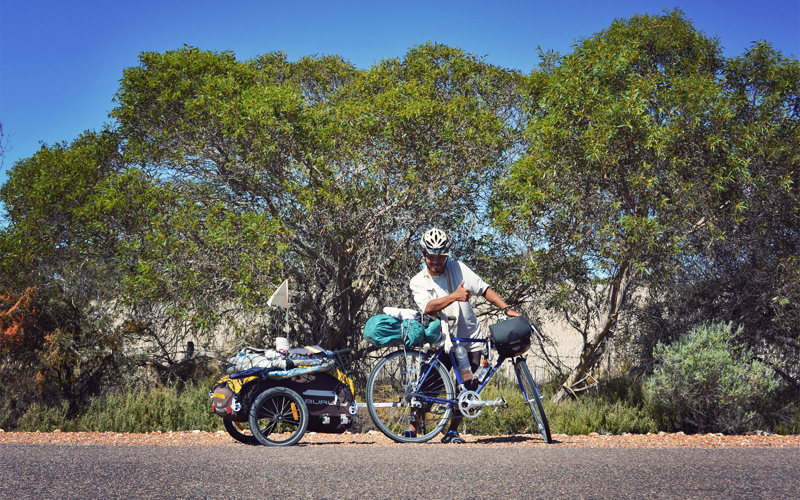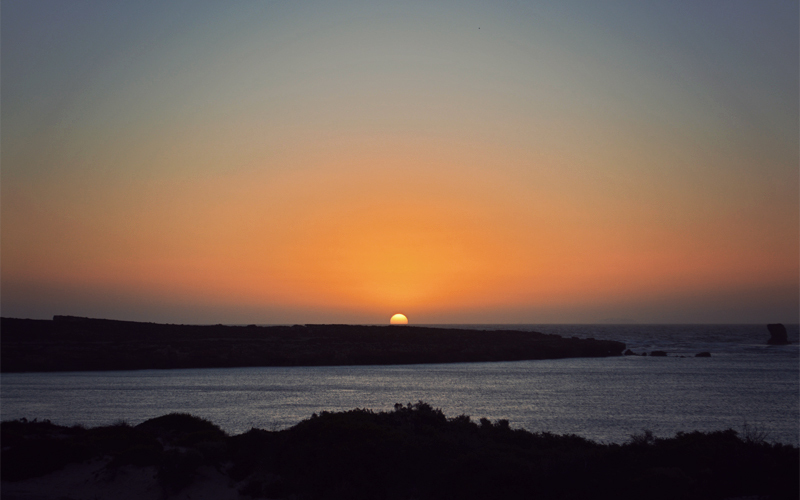January 30, 2015
Day 157: Elliston, SA
Ian and Dianne roll into the driveway in separate cars just after 8:30. They're headed to Port Lincoln to drop off one of the school's maintenance trucks at the repair shop and take care of some other big-city business and they offered to take us with them.
I ride with Ian in the first car, an older Toyota sedan. As I stare at the air conditioning button and notice how the letters and symbols have been worn away from constant use in the hot Australian summers, I realize that I'm looking at the dashboard because my mind is seeking something — anything — different to look at. Even though we've only been in the car for about fifteen minutes, the world beyond the windshield has all but lost its shape. It's the first time I can appreciate how little the landscape changes with the speed and lack of sensory feedback a car gives you, and how easy it would be as a driver to zone out for a moment and drift off the edge of the road or across the center line. A few times I see a box truck approaching from the other direction, of the kind that was involved in both of the fatal accidents we saw in the last week. I watch them very closely as they approach, with all of that speed and all of that size. I find myself imagining what it must have been like for the drivers and passengers that were killed to realize what was about to happen to them in the split second before the impact, when it was already too late to hit the brakes or veer off into the shoulder.
Kristen and Dianne travel behind us in the truck. Kristen explains:
It’s a little over an hour to get there and I’m focusing hard on the horizon and Jeff and Ian in the car in front of me, hungover and unused to riding in a vehicle. The motion is making me queasy. So for the first while the effort of conversation comes from Dianne. But after telling "the story" — where we're from, why we decided to go on this trip, those kinds of things — in a half-hearted way, I realize I'm missing out. Meeting people on the road isn't just about talking about how amazing and adventurous you are. It’s about asking them questions, learning about their lives. Jeff is great at this. His ability to ask thoughtful questions was what drew me in when I first started talking to him back in Portland and I see how it draws people in when we stop for more than just a minute to talk with someone. Up until now I've mostly been quiet in the background, content to just listen or chime in with a cheerful word now and then. But here's my chance! With a quick shift in my brain, I scan through what I could say and what hasn't already been said. But my mind is blank, as so often happens with people I don’t know.
"What inspired you to work in a library?" I ask.
It’s an obvious question, though it took me long enough.
"Well, I never wanted to leave school," she says. "But my father pulled me out to work on the farm and take care of the other kids after eighth grade. Since then I've worked on my own farm, raised my own kids, taken care of all the finances. It's been pretty busy. A few years ago I decided to go back and finish my education. I had to pick something to study and I've always loved libraries."
The conversation found a life of its own from there.

| Heart | 1 | Comment | 0 | Link |
In Port Lincoln we head over to the bike shop where my new wheel should be waiting. But when we get there it isn't, and soon we find out why. For whatever reason, the wheel builder in Adelaide I talked to earlier in the week decided that it wasn't worth his time to figure out how to take a payment from me over the phone or online. He chose to forget the whole thing, pass me off to a huge company that sells wheels but also a thousand other bike parts, and frame it like he was doing me some great favor, like they'd be able to provide what I needed. By doing this, all of the things that were important to me — a wheel that matched the specs we agreed on, built by someone who's known for building great wheels, and built in Adelaide so that it could be shipped to Port Lincoln overnight — were ignored. Instead I'm getting a machine-built thirty-two-spoke wheel with straight spokes and a good but not great rim. And it's coming from Melbourne, not Adelaide, which means it won't show up in Port Lincoln until at least Monday. For all of this I'm paying hundreds of dollars and have already given up half a dozen hours of my life that I'll never get back.
The only good news is that the shop has in stock the proper length of spokes needed to replace the four that broke on my rear wheel a few days ago on our way into Elliston. This means that instead of waiting around several more days for the replacement to arrive we can head back to the road and have the new wheel sent by overnight courier up north to Ceduna after it arrives in Port Lincoln. All the repaired wheel has to do is make it another 150 miles — just two days of riding — and our mechanical problems should at last be behind us.
With nothing left for us in Port Lincoln, Ian points the car back to the north. With the undecipherable patter of cricket play-by-play on the AM radio muffled by the the thundering of old tires on rough pavement, we speed through country so sparsely populated that even at better than sixty miles per hour we only see a car heading the opposite way once every fifteen minutes. That's why it's such a surprise when we spot a lone long-distance bicycle rider traveling toward us, straight into the face of the heavy afternoon sea breeze.
We pull off onto the shoulder and a few moments later we meet Riku, a solo cyclist from Japan who's riding around Australia. And he's riding literally around Australia. He started in Sydney back in October, went north to Cairns, and then continued on through Darwin, Broome, and Perth before charging east across the Nullarbor Plain. Even though he's been on the road for more than four months he still has two or three more to go as he continues on to Melbourne and back to Sydney, with a side trip to the middle of the country to see Ayres Rock thrown in as well. He's hot and tired from fighting against the headwind all day, and so as we talk Ian refills his water bottles and Dianne hands him a banana and a nectarine.
By now this kind of roadside help comes as no surprise. Over the past four days Dianne and Ian have treated us like parents would treat their own grown children, extending toward us generosity beyond anything we ever could have expected, and probably more than we have earned. Yet at the same time we can't help but think that if they hadn't been around to help, someone else in Elliston would have stepped up in their place. It's a town where people still know one another, where the feeling of community still exists, and where the doors to the houses are never locked because they never need to be locked. Back home later in the evening we realize that we will have spent more time in the Elliston District than anywhere else in Australia by the time we're ready to head back home, and we both agree there's nothing bad about that fact.
But although we appreciate all of the support we've been given since finding ourselves stuck in Elliston, we're also ready to move on. As Kristen says:
I feel trapped here: by the immobility of Jeff's bicycle, by the generosity of others, by the whims and abilities of bike shop employees. We're also dependent — suddenly dependent on others after months living within the independence of cycle touring. Add to that equation the fact that we're within a culture that thinks women should ride in the back seat, and thinks that there are "good Aboriginals" and "bad Aboriginals;" that we have to deal with the unwillingness and incompetence of bike shop employees; that we're heading into a long stretch of outback in the middle of the summer; and that we have a deadline to make in Perth. The feeling of being trapped is everywhere.
Tomorrow we ride again, and we both agree there's nothing bad about that fact either.
| Rate this entry's writing | Heart | 3 |
| Comment on this entry | Comment | 0 |

